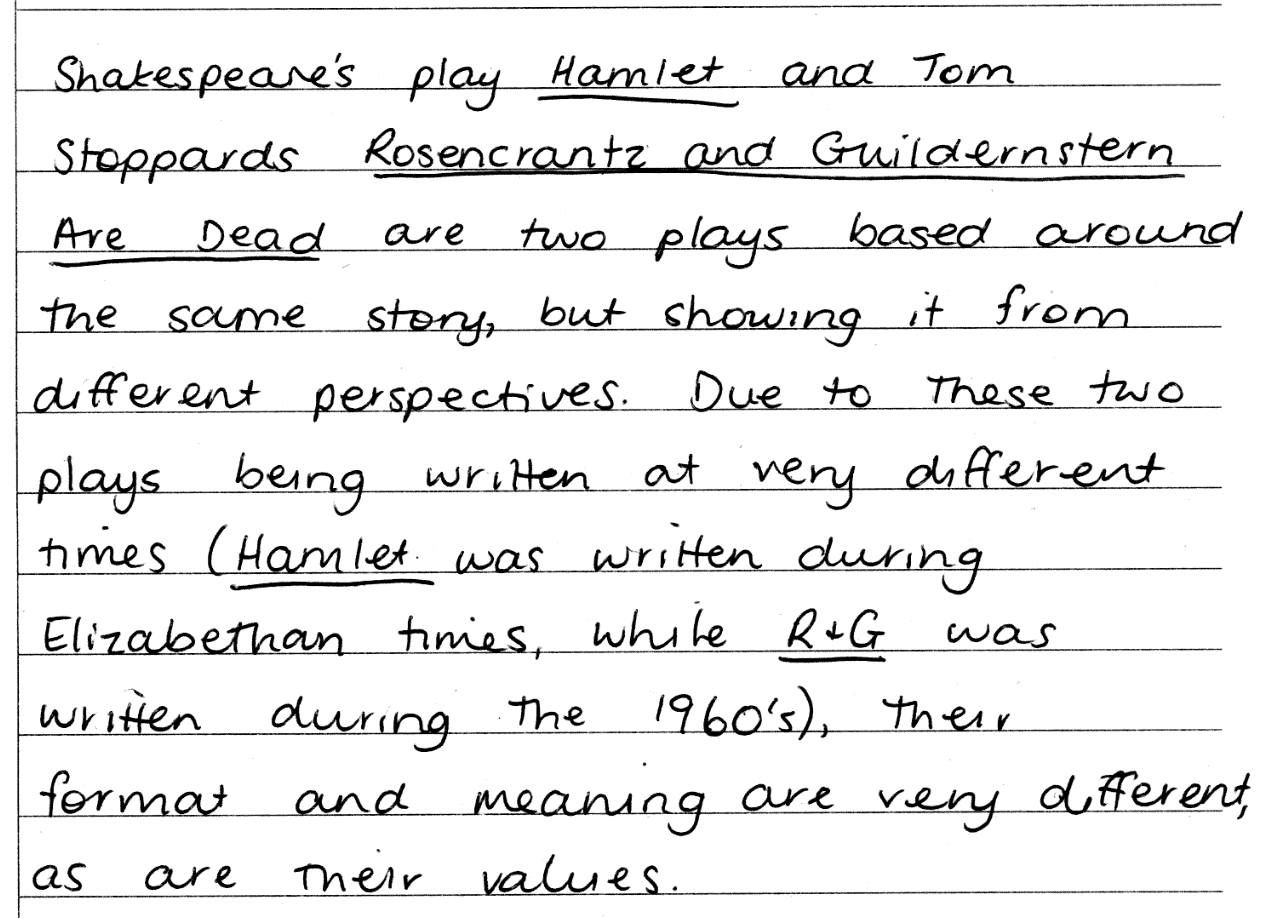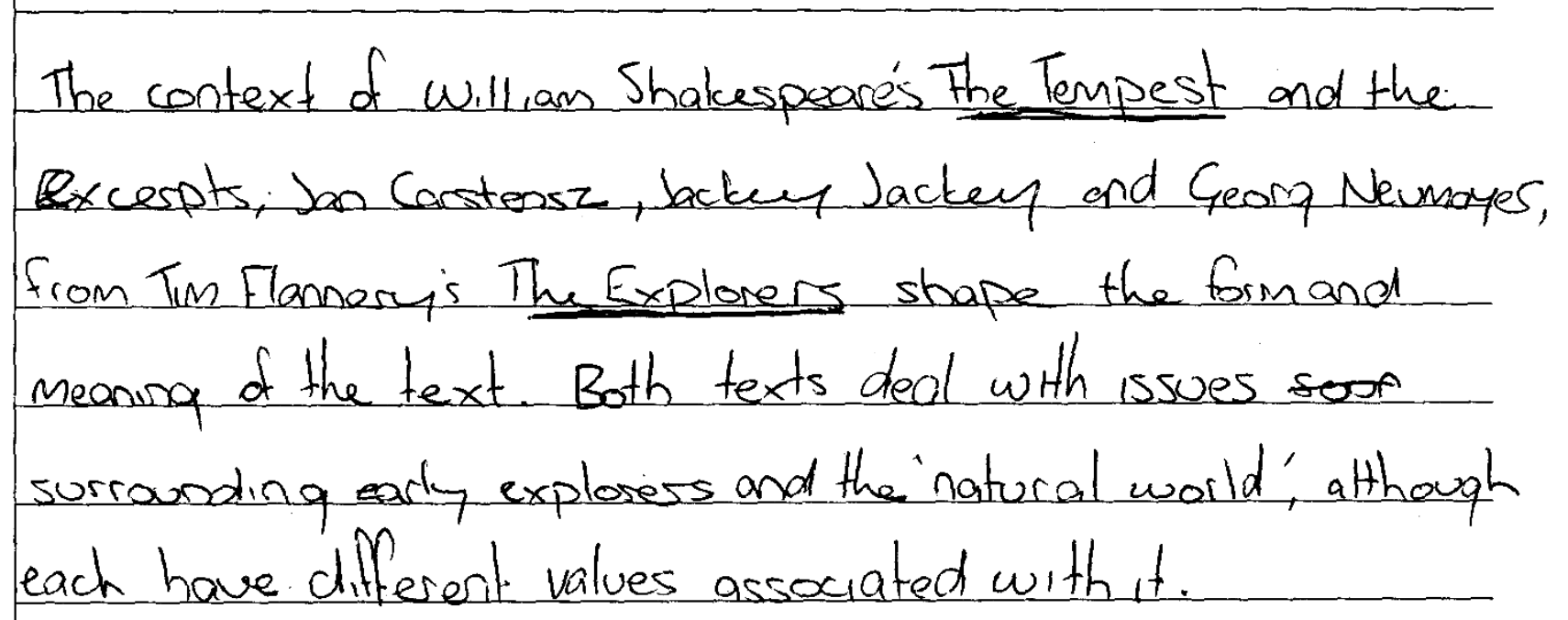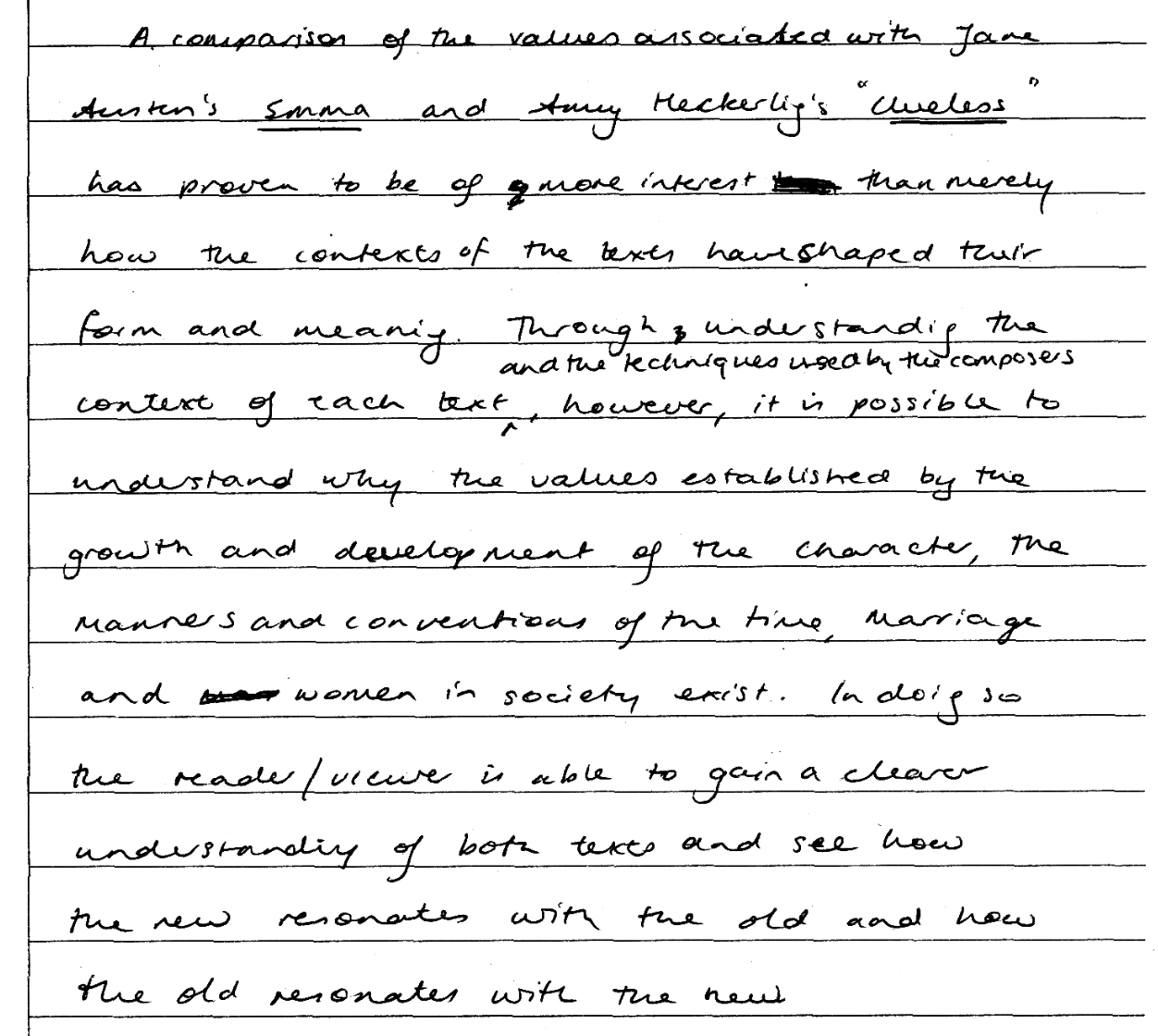
When it comes to doing HSC English, it can sometimes feel like a mystery what the difference between a Band 4, 5 and 6 HSC English essay may actually be.
That’s why we’re here to clear up the confusion and walk you through how NESA allocates a particular Band for HSC English essays and supply you with a Band 4, 5 and 6 response so you can see the difference between them!
So, it’s time to learn what constitutes a Band 6 English essay — let’s go!
What is the difference between HSC Bands for English?
What are ‘Bands’?
Achieving a Band 4
Achieving a Band 5
Achieving a Band 6
How to Achieve Your Goal Band
So what is the difference between HSC Bands for English?
Breaking down and understanding each of the top 3 bands helps you figure out what markers are looking for, as well as letting yourself set some realistic goals.
Here we’ll work to:
- Break down the criteria for each band
- Explain what they mean
- Give you some examples of what Band 4, 5 and 6 responses could look like.
So let’s get to it!
What are ‘Bands’?
‘Bands’ are how your HSC exams will be graded — instead of receiving a B+ or a mark out of 100, your exam results will be placed in a specific band.
Essentially Bands are categories used to identify how well a response fulfils specific criteria.
There’s Band 1 through to Band 6, with Band 6 being the highest and most sophisticated band to achieve.
Generally it’s easiest to think of the bands as being like regular alphabetical grades, and each band has a different mark range:
- Band 6 – 90-100 marks or an A grade
- Band 5 – 80-90 marks or a B grade
- Band 4 – 70-80 marks or a C grade
- Band 3 – 60-70 marks or a D grade
- Band 2 – 50-60 marks or an E grade
- Band 1 – 0-49 marks or an F grade
In other words, just as a C would be an average or pass mark on any other exam, a Band 4 is the benchmark band you’d want to be looking at where your marks fall between 70-80 marks.
So let’s jump in and take a look at what a Band 4, Band 5 and Band 6 mark looks like in HSC English.
What does a Band 4 look like in HSC English?
NESA describes the English Band 4 criteria as follows;
“Demonstrates sound knowledge and understanding of the way meanings are shaped and changed by context, medium of production and the influences that produce different responses to texts. Describes and analyses a range of language forms, features and structures of texts and explains the ways these shape meaning and influence responses in a variety of texts and contexts. Presents a sound critical personal response showing developed skills in interpretation and analysis of texts. Composes imaginatively, interpretively, critically and reflectively with confidence and control for a variety of audiences, purposes and contexts in order to explore and communicate ideas, information and values.”
So what on earth does that mean?
Let’s break it up and look at exactly what the criteria is actually asking for!
| Sentence | Meaning |
|---|---|
| "Demonstrates sound knowledge and understanding of the way meanings are shaped and changed by context, medium of production and the influences that produce different responses to texts." | You show that you understand the basics of how time and place (context), text types (medium of production) and other influences can shape meaning in a text. |
| "Describes and analyses a range of language forms, features and structures of texts and explains the ways these shape meaning and influence responses in a variety of texts and contexts." | You show that you can describe and analyse different text types, literary and visual techniques and explain how they create meanings or ideas in different texts and contexts (time and place). |
| "Presents a sound critical personal response showing developed skills in interpretation and analysis of texts." | You show that you can write a basic analytical response with your own, developed ideas about different texts. |
| "Composes imaginatively, interpretively, critically and reflectively with confidence and control for a variety of audiences, purposes and contexts in order to explore and communicate ideas, information and values." | You write analytical responses (ignore the imaginatively part for this section) confidently and with structure for different questions and about different texts, while looking at many different ideas. |
Altogether, a Band 4 response is essentially covering the basics of what’s being asked.
That is, responses that answer the question sufficiently but don’t go any further than what’s been asked.
Sometimes this can mean responses that don’t go into much detail or ones that have very basic ideas.
It can also include responses that haven’t been structured as well as they could be, or ones where texts are analysed completely separately from one another (no comparisons made).
That’s not to say that a Band 4 isn’t a good mark! It’s basically saying you filled all the criteria, but if you want to step up a band you need to go one step beyond.
Example HSC English Band 4 Response:
Even in this first paragraph you can see that, though the student is making clear references to their texts and their central idea (that the format, meaning and values of the texts are different), there are areas that could use improvement.
The fact that the student uses less sophisticated language, e.g. “story“ rather than “narrative” makes the response feel less formal, and the student has failed to immediately point out what techniques or themes they plan to discuss.
This limited detail continues throughout the response, and while the student answers the question sufficiently, the unsophisticated language and lack of depth keep the response from making that jump to a Band 5.
What does a Band 5 look like in HSC English?
NESA describes the English Band 5 criteria as follows;
“Demonstrates detailed knowledge, perceptive understanding and effective evaluation of the ways meanings are shaped and changed by context, medium of production and the influences that produce different responses to texts. Displays well developed skills in describing and analysing a broad range of language forms, features and structures of texts and explaining the ways these shape meaning and influence responses in a variety of texts and contexts. Presents a critical personal response showing well developed skills in interpretation, analysis, synthesis and evaluation of texts and textual detail. Composes imaginatively, interpretively, critically and reflectively with flair, originality and control for a variety of audiences, purposes and contexts in order to explore and communicate ideas, information and values.”
This criteria is pretty similar to that of the Band 4, however a few key words have changed and more details added to help separate the Band 5 responses from Band 4 ones.
Let’s break it down again.
| Sentence | Meaning |
|---|---|
| "Demonstrates detailed knowledge, perceptive understanding and effective evaluation of the ways meanings are shaped and changed by context, medium of production and the influences that produce different responses to texts." | You show that you have a strong understanding of the details of how time and place (context), text types (medium of production) and other influences can shape meaning in a text. You can also evaluate these things effectively (analyse them). |
| "Displays well developed skills in describing and analysing a broad range of language forms, features and structures of texts and explaining the ways these shape meaning and influence responses in a variety of texts and contexts." | You show that you can describe and analyse in detail many different text types, literary and visual techniques and explain how they create meanings or ideas in different texts and contexts (time and place). |
| "Presents a critical personal response showing well developed skills in interpretation, analysis, synthesis and evaluation of texts and textual detail." | You show that you can write a detailed analytical response with your own, developed ideas and then analyse and evaluate different texts and literary themes/techniques. |
| "Composes imaginatively, interpretively, critically and reflectively with flair, originality and control for a variety of audiences, purposes and contexts in order to explore and communicate ideas, information and values." | You write analytical responses (ignore the imaginatively part for this section) confidently, using your own original ideas and with strong structure, for different questions and about different texts, while looking at many different ideas. |
A Band 5 response requires more complex details as well as a developed understanding in your response.
This essentially means that going into greater detail in your responses shows markers that you have a more developed understanding of what you’re actually writing about, making your analytical writing stronger.
It also means that by going into detail you’re able to better show that you’ve come up with your ideas on your own, rather than using cliche or overdone ones, and can actually back them up.
What therefore separates a Band 5 response from a Band 4 is attention to detail and in-depth knowledge.
This can be seen even by comparing the introduction of this Band 5 sample response to the Band 4 one above.
Example HSC English Band 5 Response
Analysis:
Though this introduction is shorter, it’s also more concise, meaning it’s packed more information into fewer words.
Already this student is using more sophisticated language, e.g. “context” instead of “different times”, as well as pointing out what key ideas they’re actually going to be analysing — “issues surrounding early explorers and the ‘natural world”.
Though this is only a very small section, the rest of the response continues this greater attention to detail and more in-depth exploration of ideas that puts its one step above the earlier Band 4 response.
What does a Band 6 look like in HSC English?
NESA describes the English Band 6 criteria as follows;
“Demonstrates extensive knowledge, insightful understanding and sophisticated evaluation of the ways meanings are shaped and changed by context, medium of production and the influences that produce different responses to texts. Displays highly developed skills in describing and analysing a broad range of language forms, features and structures of texts and explaining the ways these shape meaning and influence responses in a variety of texts and contexts. Presents a critical, refined personal response showing highly developed skills in interpretation, analysis, synthesis and evaluation of texts and textual detail. Composes imaginatively, interpretively, critically and reflectively with sustained precision, flair, originality and sophistication for a variety of audiences, purposes and contexts in order to explore and communicate ideas, information and values.”
Yet again the criteria has had some minor word changes and additions that have a pretty big overall impact on what it’s asking for, so let’s break it down one more time.
| Sentence | Meaning |
|---|---|
| "Demonstrates extensive knowledge, insightful understanding and sophisticated evaluation of the ways meanings are shaped and changed by context, medium of production and the influences that produce different responses to texts." | You show that you have a strong, very detailed understanding of exactly how time and place (context), text types (medium of production) and other influences can shape meaning in a text. You can also evaluate these things (analyse them) in a sophisticated way. |
| "Displays highly developed skills in describing and analysing a broad range of language forms, features and structures of texts and explaining the ways these shape meaning and influence responses in a variety of texts and contexts." | You show that you are very skilled and practiced at describing and analysing in detail many different text types, literary and visual techniques. You can then explain how they create meanings or ideas in different texts and contexts (time and place). |
| "Presents a critical, refined personal response showing highly developed skills in interpretation, analysis, synthesis and evaluation of texts and textual detail." | You show that you can write a detailed, sophisticated analytical response with your own, developed ideas. You can effectively analyse and evaluate different texts and literary themes/techniques. |
| "Composes imaginatively, interpretively, critically and reflectively with sustained precision, flair, originality and sophistication for a variety of audiences, purposes and contexts in order to explore and communicate ideas, information and values." | You write sophisticated analytical responses (ignore the imaginatively part for this section) confidently, using your own, detailed original ideas and with strong structure. You're detailed in answering different questions about different texts, while looking at many different ideas. |
The focus of all the changes from Band 5 to Band 6 is sophistication and refinement.
Sophistication isn’t only about using fancy words, however, as the criteria points out that your actual ideas and analysis must be detailed and sophisticated as well.
Therefore you’re wanting to look at different, out of the box ideas, comparing and contrasting your texts in an effective way and structuring your response so that it all flows smoothly.
This basically means that if your response can answer the question with detail and highly sophisticated language and structure, you’ll be able to manage a Band 6.
Separating a Band 6 response from a Band 5 is largely about the overall sophistication and refinement of the response, which we can see by comparing this next sample to our Band 5 one.
Example HSC English Band 6 Response
Immediately this student brings comparison of the texts into play, signalling that they intend to analyse the texts as individuals as well as against each other.
The student also employs strong, sophisticated language throughout, e.g. “values established”, “conventions”, “resonates”, and conveys their ideas in a more detailed way.
They also make sure to establish what specific themes they’re going to be discussing (“…development of the character, manners and conventions of the time, marriage and women in society.”) showing from the start a more detailed and refined analysis is to follow.
Even by itself this introduction is a perfect example of what a Band 6 response should look like and how its sophistication and detail set it apart from a Band 5.
How to Achieve your Goal Band
At the end of the day not every student is able to achieve a Band 6 — and that’s fine!
The point of understanding the Bands is so that you can see exactly what you need to do to achieve each one as well as being able to set yourself a reasonable goal.
If you know that you can improve how much detail you include in your responses aim to work towards a Band 5.
Likewise, if you look at the Band 6 sample response and think that you could write something like that, start working at producing Band 6 responses!
Understanding the bands makes it easier for you to improve because you know exactly what criteria you are and aren’t filling.
This means that it can also help you edit and mark your own practice responses to see what band you’d currently be fitting into.
Give it a try!
Grab the last analytical essay you wrote for English and compare it to the criteria for each band.
Figure out which band you fit in for each of the four sentences we broke down above, then average it out to see what band you’d be in.
For example 2x Band 4s, 1x Band 5, 1x Band 6 would leave you averaging a low Band 5.
Once you know where you’re sitting, figure out what your goal band would be and see what areas you need to improve on to get there!
You can also find more sample answers here to see how different responses can fit within the same bands.
Are you looking for some extra help with HSC English?
We pride ourselves on our inspirational HSC English coaches and mentors!
We offer tutoring and mentoring for Years K-12 in a large variety of subjects, with personalised lessons conducted one-on-one in your home or at our state of the art campus in Hornsby or the Hills!
To find out more and get started with an inspirational tutor and mentor get in touch today!
Give us a ring on 1300 267 888, email us at [email protected] or check us out on Facebook!
Maddison Leach completed her HSC in 2014, achieving an ATAR of 98.00 and Band 6 in all her subjects. Having tutored privately for two years before joining Art of Smart, she enjoys helping students through the academic and other aspects of school life, even though it sometimes makes her feel old. Maddison has had a passion for writing since her early teens, having had several short stories published before joining the world of blogging. She’s currently studying a Bachelor of Design at the University of Technology Sydney and spends most of her time trying not to get caught sketching people on trains.





